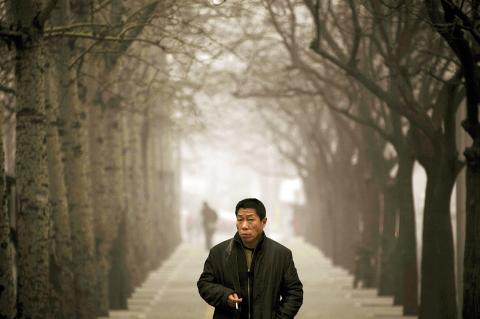Residents across northern China battled through choking pollution yesterday, as air quality levels rose above index limits in Beijing amid warnings that the smog may not clear until tomorrow.
Visibility was reduced to about 200m in the center of the capital, where mask-wearing pedestrians made their way through a murky haze, despite warnings from authorities to stay indoors unless absolutely necessary.
In a Beijing city office visited by reporters, up to 20 workers wore gas-mask style protective headgear at their desks as the cloud of pollution shrouded large swathes of the country for the second consecutive day.

Photo: Reuters
State broadcaster China Central Television (CCTV) showed vehicles using full headlights in mid-morning to light a way through the smog, mainly in badly affected Henan Province.
A total of 109 flights were canceled at Zhengzhou Airport in Henan, said CCTV, adding that the haze would last until tomorrow.
In Shandong Province, almost 2,000 passengers were stranded at Qingdao’s main airport after it shut with 20 flights canceled as visibility dropped to 100m, Xinhua news agency reported.
It is at least the fourth time a dense cloud of haze has descended on northern China this winter, with even state media repeatedly expressing anger over the issue.
The China Daily reiterated its calls for firm action yesterday, directing them at newly installed Beijing Mayor Wang Anshan (王安順), who formally took over on Monday.
“What do Beijing residents expect of their new mayor?” the newspaper asked in an editorial. “Of all the things that need improving, cleaner air will be at the top of many people’s wish list.”
Wang was quoted by Xinhua as saying: “The current environmental problems are worrisome.”
The US embassy’s air quality index reading for Beijing stood at 475 and “hazardous” at noon yesterday, after having reached 517, or “beyond index,” at 6am.
The index rates a reading over 150 as “unhealthy,” above 300 as “hazardous,” while anything over the upper limit of 500 is regarded as “beyond index.”
Meanwhile, the Beijing Municipal Environmental Monitoring Center gave the figure as 414 at noon, indicating the capital’s air was “severely polluted.”
The toxic air follows an extreme bout of pollution earlier this month, peaking on Jan. 13 when state media said readings for PM2.5, particles small enough to deeply penetrate the lungs, reached 993 micrograms per cubic meter, almost 40 times the WHO’s recommended safe limit.
At the height of the smog, many Beijing residents rushed to buy face masks and air purifiers, and doctors at two of Beijing’s major hospitals said the number of patients with respiratory problems had increased sharply during the period.
China’s pollution problems are blamed on the country’s rapid urbanization and dramatic economic development.
However, experts have raised questions over China’s will and ability to tackle car and coal use, which are seen as key causes of the phenomenon.

The Burmese junta has said that detained former leader Aung San Suu Kyi is “in good health,” a day after her son said he has received little information about the 80-year-old’s condition and fears she could die without him knowing. In an interview in Tokyo earlier this week, Kim Aris said he had not heard from his mother in years and believes she is being held incommunicado in the capital, Naypyidaw. Aung San Suu Kyi, a Nobel Peace Prize laureate, was detained after a 2021 military coup that ousted her elected civilian government and sparked a civil war. She is serving a

REVENGE: Trump said he had the support of the Syrian government for the strikes, which took place in response to an Islamic State attack on US soldiers last week The US launched large-scale airstrikes on more than 70 targets across Syria, the Pentagon said on Friday, fulfilling US President Donald Trump’s vow to strike back after the killing of two US soldiers. “This is not the beginning of a war — it is a declaration of vengeance,” US Secretary of Defense Pete Hegseth wrote on social media. “Today, we hunted and we killed our enemies. Lots of them. And we will continue.” The US Central Command said that fighter jets, attack helicopters and artillery targeted ISIS infrastructure and weapon sites. “All terrorists who are evil enough to attack Americans are hereby warned

Seven wild Asiatic elephants were killed and a calf was injured when a high-speed passenger train collided with a herd crossing the tracks in India’s northeastern state of Assam early yesterday, local authorities said. The train driver spotted the herd of about 100 elephants and used the emergency brakes, but the train still hit some of the animals, Indian Railways spokesman Kapinjal Kishore Sharma told reporters. Five train coaches and the engine derailed following the impact, but there were no human casualties, Sharma said. Veterinarians carried out autopsies on the dead elephants, which were to be buried later in the day. The accident site

RUSHED: The US pushed for the October deal to be ready for a ceremony with Trump, but sometimes it takes time to create an agreement that can hold, a Thai official said Defense officials from Thailand and Cambodia are to meet tomorrow to discuss the possibility of resuming a ceasefire between the two countries, Thailand’s top diplomat said yesterday, as border fighting entered a third week. A ceasefire agreement in October was rushed to ensure it could be witnessed by US President Donald Trump and lacked sufficient details to ensure the deal to end the armed conflict would hold, Thai Minister of Foreign Affairs Sihasak Phuangketkeow said after an ASEAN foreign ministers’ meeting in Kuala Lumpur. The two countries agreed to hold talks using their General Border Committee, an established bilateral mechanism, with Thailand